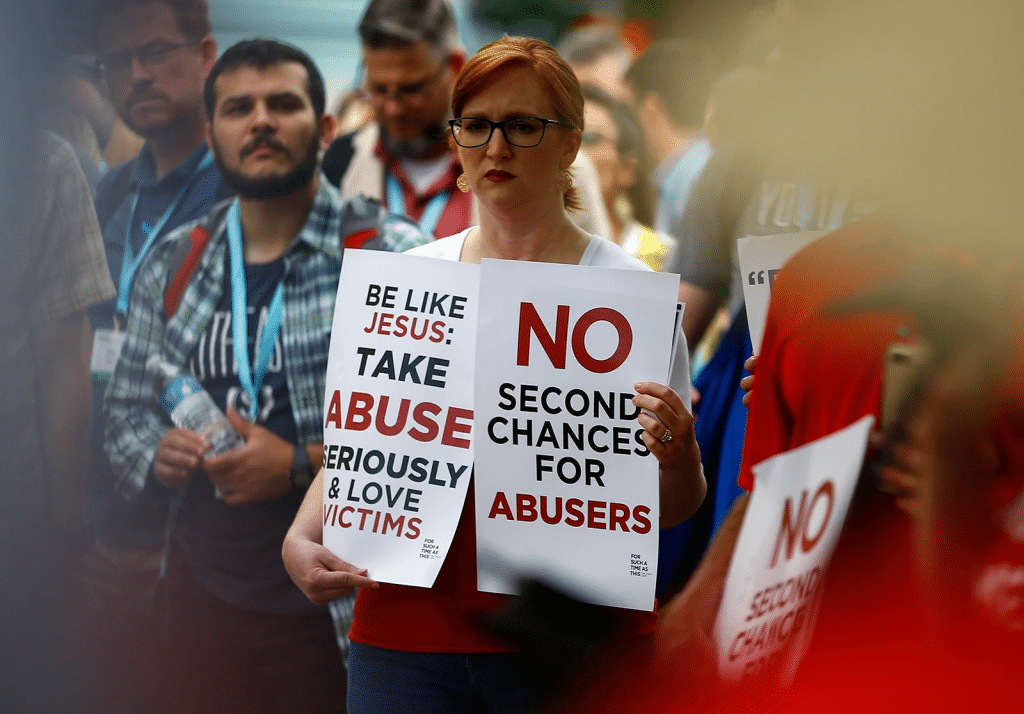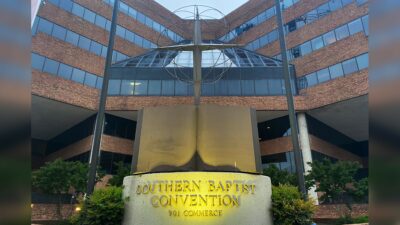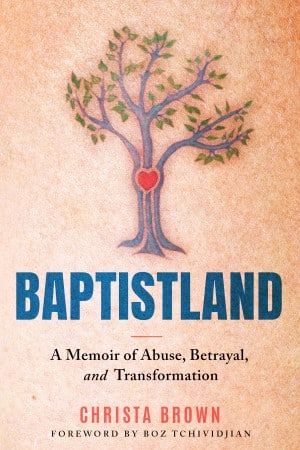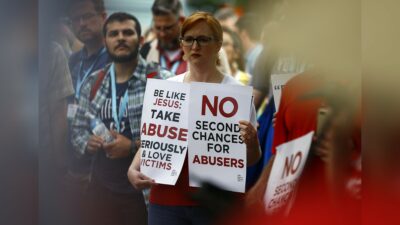Sometime in the next few days, members of the Southern Baptist Convention’s Executive Committee will meet for the third time in three weeks — hoping to resolve a stalemate over the details of an investigation into the committee’s own handling of sexual abuse in the nation’s largest Protestant denomination.
The committee, which is charged with making decisions for the SBC between its annual meetings, has held several epic, hours-long meetings wrestling with how much access it will grant a third-party investigator to its previous communications about sexual abuse allegations. Their hesitation has invited accusations of a coverup while its defenders say full transparency could result in lawsuits that would bankrupt the denomination.
But what is at stake, say some Southern Baptists is the trust that holds the SBC together. The crisis has led pastors and seminary presidents alike — who are often reticent to criticize their fellow conservative leaders — to call for the committee to get its act together before it is too late.
A brief summary of how the SBC got here:
Why is the SBC only now coming to terms with sexual abuse?
Unlike the Roman Catholic Church or other denominations with a strong hierarchy, national leaders of the SBC have little control at what happens in local churches, including the hiring and firing of pastors and other staff. While SBC leaders have condemned abuse, they’ve long claimed that no direct denominational action is possible. For more than a decade, they have discussed compiling a database of accused sexual abusers for the use of local churches, but it has never been established.
Your tax-deductible gift helps our journalists report the truth and hold Christian leaders and organizations accountable. Give a gift of $30 or more to The Roys Report this month, and you will receive a copy of “Baptistland: A Memoir of Abuse, Betrayal, and Transformation” by Christa Brown. To donate, click here.
Some church leaders have also long claimed that abuse is not a problem in the SBC, calling their church some of the safest places in the country, while others allege that sexual abuse victims and their advocates are creating a distraction for their own purposes.
What changed?
Rank-and-file Southern Baptists had become increasingly uneasy about the denomination’s approach to sexual abuse issues, particularly after Paige Patterson, the president of a major seminary and a legend in the denomination was fired for mishandling a sexual assault case at his school.
Then in February 2019, an investigation by the Houston Chronicle reported on hundreds of cases of alleged sexual abuse by pastors and others at Southern Baptist churches. In some cases, the Chronicle’s investigation showed, pastors had moved from church to church, abusing both children and adults. Some churches had convicted sex offenders on staff.
Responding to the outcry that followed, then-Southern Baptist President J.D. Greear urged the Executive Committee to investigate several churches mentioned in the Chronicle’s report. He also recruited attorney and abuse survivor Rachael Denhollander, who had helped convict former USA Gymnastics team doctor Larry Nassar of abuse, to advise the SBC.
At that year’s annual meeting, Greear led a service of lament for what they now called a crisis of abuse. The delegates to the meeting, known as messengers, also voted to change the denomination’s bylaws to allow Southern Baptists to expel churches that mishandled abuse.
In October 2019, Russell Moore, who then headed the SBC’s Ethics and Religious Liberty Commission, held a conference called Caring Well, dedicated to the issue of sexual abuse, at which Denhollander accused SBC leaders of mishandling the case of abuse survivor Jennifer Lyell. Moore himself accused leaders — especially staff and board members of the Executive Committee — of mistreating survivors.
That was two years ago.
Yes, but last year’s annual meeting was canceled due to the pandemic, preventing sexual abuse advocates from forcing the issue. But as this year’s June annual meeting approached, Russell Moore resigned his SBC post, and in a leaked letter accused SBC leadership of making his life miserable, largely for his advocacy against sexual abuse.
When they arrived at the annual meeting in Nashville, Southern Baptists were fed up. More than 18,000 of them showed up determined to hold the Executive Committee accountable. They voted overwhelmingly to set up an investigation into how the Executive Committee handled allegations of abuse and whether abuse survivors had been mistreated.
The Executive Committee tried to head that off by setting up their own investigation, but the messengers were having none of it. They overruled the chair of the meeting and passed a motion to set up a task force to oversee an independent investigation. Most controversially, the motion ordered the Executive Committee to be completely transparent by waiving attorney-client privilege if asked to do so.
Shortly afterward, the seven-person task force appointed by new SBC President Ed Litton named Guidepost Solutions their choice to conduct the investigation.
What is attorney-client privilege?
When lawyers and their clients confer on legal matters, their discussions are considered confidential, and therefore their communications can be shielded in any investigation. Clients may, however, consent to a waiver of this privilege, giving lawyers permission to reveal confidential information.
Are Executive Committee members accused of abuse?
Not that we know of. The allegations have mostly about dismissing the needs of abuse survivors and refusing to counter the problem on a national basis.
So what’s the problem?
Ronnie Floyd, president and CEO of the Executive Committee, balked at waiving privilege, as did many long-time committee members, claiming that waiving privilege, by opening the door to costly lawsuits, would violate their duty to protect the SBC’s assets. They have refused to include a blanket waiver in the contract with Guidepost, suggesting instead that access to information can be negotiated. In two grueling committee meetings — one in person, one online — members deadlocked over the contents of the contract.
The chair of the task force, a North Carolina pastor named Bruce Frank, along with his fellow task force members, have pushed back, demanding a waiver and backing up their demand with legal analysis claiming that a refusal to waive attorney-client privilege is riskier legally.
So that’s it? It’s over one clause in a contract?
No, the fight has ramifications for the governance of the SBC itself. The ultimate power in the convention traditionally rests with its constituent churches, not its denominational leaders. Those churches express their will through the votes of the messengers at annual meetings.
At least one Executive Committee member has scoffed at the idea that the group has to follow the lead of the messengers. “15,000 people don’t have the power to tell us to do anything,” said Joe Knott, a North Carolina attorney and committee member, referring to the messengers at the last SBC meeting.
The refusal by the Executive Committee to follow the will of the messengers could lead to a crisis in the denomination, several prominent members say. Floyd himself wrote in 2020 that “If we ever invert this order in our mindset and practice, then we will begin a downhill slide that may become irreversible.”
What does that mean in practice?
The SBC relies on its Cooperative Program — a voluntary sharing of hundreds of millions in donations — to fund its national and international work and structures. If the Executive Committee defies the will of local churches, they could stop sharing their funds, disempowering the national leadership and ultimately possibly dissolving the denomination itself.
 Bob Smietana is a national reporter for Religion News Service.
Bob Smietana is a national reporter for Religion News Service.





















27 Responses
The relationship between the SBC EC and the constituent Churches of the SBC appears ill-defined, certainly to outsiders, and perhaps also to the members of the SBC and its EC.
If the Churches act independently, and abuses have been confined to those Churches, then it would seem that the proper locus of action on abuse, would seem to be on the plane of those Churches. So something that the messengers, as representatives of those Churches, should be dealing with amongst themselves.
If that reasoning is accepted, then the shift of focus to the EC that the messengers have demanded, would seem out of place.
That being said, there may be something to be constitutionally resolved, about the existence and nature of the EC. So maybe something with a lot of historical baggage. Possibly a struggle here that the EC are likely to lose.
good assessment, in a generalization way there are three audiences: 1st the public which the SBC is losing from how this has progressed, 2nd the legal issue with the Baptist autonomy issues which at this point do not appear to have the SBC EC in jeopardy, and 3rd the SBC partnerships and the churches which fund voluntarily the collective SBC mission via its entities — troubles on two fronts, and trouble could arrive to the legal front, while the SBC EC appears to not have any legal jeopardy at this time
It does seem that secular and faith factors and dynamics, in the SBC difficulty, have come to an intense and complex head.
My personal sense is that the secular and faith-projects, are always partners in what is brought about that endures. There will be authentic faith moments that do not yield any enduring product; but we do tend to understand faith-projects across what endures (as theology, as rituals, as architecture, as what societies and persons they play part in bringing about, and more).
I sense that all parties to this SBC difficulty, would benefit from acknowledging that part in their respective believings and practices that are secular through and through.
The Conservative grouping’s believing and practices being inseparable from the American secular society of a historical past, the progressive grouping’s believing and practices partaking strongly of secular impulses and projects such as feminism and critical race theory.
The purpose of being transparent about the secular, is that it gives an opportunity to take its force out of genuine attempts for reconciliation on a faith plane.
The denomination can’t have it both ways. They can’t settle cases, presumably on behalf of constituent churches and then claim that they have no power to act. There’s a fundamental flaw somewhere (I think I hear you saying that to some degree), which needs to be identified and resolved.
Is it not the local churches responsibility to handle any abuse case in their church? What does the denomination or the exec committee have to do with it?
good question, unless there has been an unpublished claim against an SBC EC staff member or committee member
Thanks for a succinct summary. Let’s pray for a majority of Executive Committee members to realize that the SBC’s greatest asset is not those “hundreds of millions” of donation dollars. At risk is an authentic gospel witness to our unsaved world that desperately needs the message of Jesus. What does it profit an organization to keep its earthly wealth but lose opportunity to win souls for eternity?
A little humility wouldn’t hurt, either. I cringe at the prospect of appearing before God in heaven and explaining why “15,000 people don’t have the power to tell us to do anything,” even if that statement is legally accurate.
CEC. A possible counter argument to what you say, might be seen as Christian pragmatism. Christian endeavours of past and present have played part in mediating a Christianised society, which society is motivated to provide the dollars, which then allows for works which do good and support faith outreach. The SBC playing its part in this process.
While good or pastoral works my not yield authentic gospel witness or the saving of the human world, they are arguably endeavours which prove possible, endeavours which keep the greater intentions of faith, in line of sight.
My sense is, that the Bible as we have it, is essentially conservative. Firstly as its core thesis was central to the project of mediating a Jewish people. Secondly, as its core thesis was reframed to become universally applicable.
Jesus then does seem to stand with progression, but that stand is had within a core conservative hermetic.
What we currently seem to have in this SBC difficulty, is a complex collision between what is progressive and what is conservative. All the Bible then tells us, is; that the conservative will strive to crucify what is progressive. Where, apart from John, cleaving to the project of authentic gospel witness leads to martyrdom, albeit faith in that witnessing survives.
One possible question then is; can we find a way of breaking the cycle in this. Would speaking to that possibility be a part of authentic gospel witness.
“My sense is, that the Bible as we have it, is essentially conservative. Firstly as its core thesis was central to the project of mediating a Jewish people. Secondly, as its core thesis was reframed to become universally applicable.”
How is it that these core theses make the bible “conservative”?
————
“Jesus then does seem to stand with progression, but that stand is had within a core conservative hermetic.”
I’m not seeing how the said core hermetic (hermeneutic?) is necessarily conservative (or progressive, for that matter). However, my question at this point is are you saying Jesus’ teachings resemble the progressive politics of our day?
————
I’ll finish by saying I think the christian mindset reduces everything down to either inherently conservative or progressive. What is the point of straining the bible through a politicized & polarized 21st century grid?
Truths in the bible are neither conservative nor progressive. They just are. In practical terms, they light up all across the political spectrum. It is a mistake of logic (& in just being able to function) for christians to polarize truth.
Scottie, thank you for replying. The fundamental matter is, that what I sense and say is personal and individual; I see things as I do because of what and who I find myself to be.
I view the Old Testament (and written works that Judaism relies on) as an epistemological and ontological technology central to the mediation of the Jewish people. Where it is the invention and purpose of this language-based technology (“word”) that is expressed in the idea of ‘God’s chosen people’. Pre-Jewish invention of the language usage we speak of as the “word” (with its pivotal idea of G_d/God). As long as a chosen/subscribing population cleave to that hermetic, the Jewish people are mediated in an enduring manner; where in their locale they can compete for land and resource and a cvilisation. It is this bringing-about and conserving (of a Jewish people) that I flag as conservative.
Jesus, as we know of him through the New Testament, not only critiques the detail of the nominal cleaving of a Jewish people to the Judaic G_d/hermetic, he is framed (reframed?) by those and that which yields Christianity, in a manner which transcends the blood conditions of being Jewish, to see the Judaic hermetic transposed or morphed to a form applicable universally to all human beings. We move from G_d’s chosen being a Jewish people, to God’s chosen being all of human kind. It is this that I flag as progression.
The historical Jesus does not reject the Judaic hermetic he is born into; and thereby continues to work and rework the resource of that hermetic. While those who write the Gospels about him, detail a Jesus whose words of believing differ from the words of the Old Testament. Again we have a complex progression from a conservative Judaic beginning.
“… are you saying Jesus’ teachings resemble the progressive politics of our day?”
Yes, if we run the comparison one-way. Relative to the hermetic of respective times, Jesus is doing all that current progressive politics are doing, but those involving themselves in current progressive politics are unlikely to be doing all that Jesus was doing.
The test is, how holistic is your grasp of the hermetic of your time, and how true to that hermetic’s ground and origins is your impulse to progression or reformation.
Jesus cannot abandon the origins of the Judaic hermetic in G_d and word. Adherents to current progressive politics may end simply polemical and opportunistic as they press for self-interested advancement, and do so by way of working the cultural memes of our current time.
So, hermetically, there has to be commonality between the activity of Jesus and current progressive politics. But those involved in the latter are simply human, while we partake of Jesus presented as exceptional.
“Truths in the bible are neither conservative nor progressive. They just are. In practical terms, they light up all across the political spectrum. It is a mistake of logic (& in just being able to function) for christians to polarize truth.”
I take “truth” to be a moving matter. There is what is true for me, and then for you, and then for various groupings. Truths come and go depending on who you seek community (communion) and discourse with. Truths are resource of community and discourse, that may have to be laid aside in the moment of seeking community with those for whom these truths do not hold. Truths are relative, perhaps the most relative of aspects of being human.
Polarisation arises where we cling to truths that others do not; and in that outcome of polarisation we abandon the opportunity to learn from others whose current truths differ in some way from our own.
At an extreme, it can be argued that more harm than good has been done around the idea of truth.
Anyone who tells you there’s no such thing as absolute truth is asking you not to believe them, so don’t.
-Roger Scruton
So are you saying there are still Liberals in the SBC?
If the SBC collapsed, is there a downside?
Maybe I am too simple in my faith, love and following of Jesus my King … but this long complex story screams that the real problem is the traditional leadership structure in churches today .. with some variations, they are all basically the same… They are all in line with the leadership-way of Gentile hierarchies that Jesus forbade among brethren. Such structure is the antithesis of what Jesus told the disciples about leaders and leading. (Do not call or be called ‘leaders’) I believe this is a huge, ancient sin that has opened the door to the devil and to many evils in the church for centuries, not the least of which is sexual sin and abuse among believers. Men in authority over other men/women is something foreign to the body of Christ and the true kingdom of God that Jesus and the apostles preached. It is a deeply entrenched, unbiblical tradition. As we each truly repent for this sin and each of us return to follow the rightful and only King Jesus… well I think that is when the great revival we are all praying for will begin and this kind of shame to the Lord’s name will end! https://lemonstograpes.com/protus-publications/
“Maybe I am too simple in my faith, love and following of Jesus …”. I like your opening sentence.
My sense is, that theology and leadership begins, where faith falters. The idea of brethren held in communion/community by faith alone, is a good one. In Earth-bound practice a great deal then tends against its achievement. Theology and leadership emerge as what so tends has its effects. Another way of seeing this, is to view theology (and any leading/leadership it is associated with), as drawing in intellect (an Earth-bound capacity) to support faith.
Church is often the locus for theology and leadership, as a waystation towards achieving and sustaining faith. Those three existing in a very varied mix, and to very varied outcomes.
A difficulty with faith, is its expression. So, when you speak of Jesus as King, that expression leaves me with difficulty. We, you and I, then encountering difficulties across our respective theologies. We can of course then resolve such difficulty with respectful discourse. I’m then something of a republican or democrat, in seeing Christianity as sustained and consummated and having being, in the matrix of such discussions between myriad persons.
In the beginning was the word, and the word was with God (as a woman might be seen as with child): seems to me to suggest that it is in those discussions between persons, that God comes to work, and God-grounded sense and faith might arise.
Back in the 1970s, the Conservative Resurgence led to a removal of people from positions of power, and a large number of churches leaving the SBC. This was done to remove from the SBC anyone or any church that was liberal in their theology or at least not sufficiently conservative.
Fast forward to now, and we’re told that the SBC can’t do anything about sexual abuse because each church is independent, self-sustaining, etc etc etc.
What this indicates is that theological correctness is paramount, but policing sinful behaviour isn’t.
Correct belief and correct actions go together. If the SBC can act to maintain correct belief (orthodoxy) in its midst, it can surely act to maintain correct actions (orthopraxy). This is, after all what Jesus commanded when he taught that those who heard his teachings but didn’t obey them will be like a man who builds his house on the sand.
Perhaps the SBC should engage in a Moral Resurgence.
Amen. Your point is spot on. They can’t say they can police theology and not practice.
from my perspective, the article seems to be an accurate and balanced assessment and summary Bob
The parts of the Bible thesis that has made most sense to me, are the very first ideas of Genesis and John. The conception that then best works for me is: “In the beginning was the Word, and the Word was with God, and the Word was God.” The backdrop of that then the sense of that beginning playing out across the “waters” that preceded it.
That leads to the question of how that beginning mediates what is spoken to, in the rest of the Bible, and amongst those who come to be Biblical believers.
I think that both the Bible and secular thinking, well explain the mechanism of that mediation. The Bible anchoring its explanation in the concept and reality of “faith”. The secular, in philosophy and social science, anchoring its explanation in the idea of “reification”, and expanding that explanation in what it has to say about culture and social psychology.
Across those mechanisms we transpose the “word” to an experienced truth and reality. From there we can transpose the experienced reality of God (and Jesus), along myriad theologically paved byways.
It seems it is the variety in this mediated production, that is now causing the SBC its fundamental difficulties. Where for various reasons, the adherents to various strands of faith, cannot step back to the origins of their respective faith variations, where they might resolve their differences in a mutual return to word/God (Biblical) origins.
“Where for various reasons, the adherents to various strands of faith, cannot step back to the origins of their respective faith variations, where they might resolve their differences in a mutual return to word/God (Biblical) origins.”
Simply put, there will not be consensus on “biblical” amongst the people you describe. but that’s a good thing — the alternative is totalitarianism.
So therefore what?
There is too much power and money in the SBC, which necessarily become the object the exercise (because they exist in this magnitude, the sole mission inevitably devolves down to protect them). This is the functional mission.
The tension between the ‘stated mission(s)’ and the functional one means this crisis was also inevitable. There is no “biblical” way to resolve it because there is no one “biblical way”.
I think in the end the long-touted “this is not a hierarchy” will win out. Those who grant power and money to the EC’s “pop-up hierarchy-in-function” will vote otherwise and elsewhere. Any legal challenges will eat up dwindling resources & simply speed up the process.
a painful & messy lesson on things Jesus warned about long ago.
Some will try to blame this horrible mess on Liberals. They either left or were forced out years ago.
Repentance is not compatible with self protection. They are engaging in reputation management and asset protection.
Travis H,
Spot on, and shows who they truly serve.
The supporters will excuse, because most Christians no longer value character (only charisma pastors) and will excuse any criminal behavior (with the hate the sin, not the sinner “get out of jail free card” nonsense). Which allows people of low moral character to be in charge of a church, without consequences for their actions.
I sadly am not surprised by all of this. When the SBC Convention was taken over, many things changed. One was the subordination of women. IMO the SBC male leaders have not taken sexual abuse seriously. The only way to get their attention may be to withhold CP funds